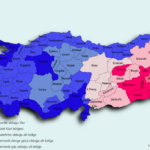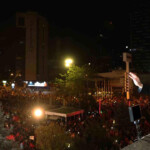The phone calls ceased. Social media communities fell silent. It was as if people had lost not only an election, but all hope for the future.
You’ve probably seen a lot of political commentary regarding the elections in Turkey on May 14.
First, I’d like to focus on the mood of the opposition voters.
On May 14, people cast their votes for the Turkish Parliament too, but the race for president between Erdoğan and Kılıçdaroğlu sparked more interest and enthusiasm. Despite the fact that the election was incredibly unfair and uneven, there were high expectations for change.
These expectations rose in the weeks ahead of the election, despite the fact that circumstances were certainly unfavorable for the opposition.
While the opposition leader’s statements were only occasionally shown on television, Erdoğan could talk simultaneously on more than twenty stations. The opposition had limited financial resources for campaigning, while Erdoğan nearly exclusively used state resources to win the election.
Still, many thought that Erdoğan was finished.
The earthquake that struck Turkey’s south this year and wrecked ten cities shook Erdoğan after 22 years in office. Even his most devoted fans had become disenchanted due to the horrendous cost of living in the nation. People entering stores could observe daily pricing fluctuations.
And, although he was very powerful, Erdoğan still had six opposition leaders united against him. Furthermore, if he won, Kılıçdarolu would be assisted by the mayors of Ankara and Istanbul, both of whom earned stunning victories in their local elections. Success seemed imminent—Erdoğan might even lose in the first round.
The atmosphere was so energetic that many couldn’t sleep the night before the election.
Then, people flocked to the polls on election day. They sat in front of their televisions after casting their ballots and eagerly awaited the results. After midnight, when it became clear that Erdoğan, even if he did not prevail in the first round, was about five points ahead of his opponent Kılıçdaroğlu, all this eager anticipation became a terrible sense of defeat.
A moment of mourning soon followed. The phone calls ceased. Social media communities fell silent. It was as if people had lost not only an election, but all hope for the future. These feelings were not exclusive to those who are passionate about politics. Almost all the opposition’s supporters felt that way.
So why was this election lost, when the opposition had such high hopes?
For a variety of reasons, but the following circumstances, I believe, played a dominant role:
First and foremost, Erdoğan used the vast media power the government possessed to his advantage in order to influence the nationalist and conservative segments of society. He did a great job of playing the nationalism card: through heavy propaganda, it appeared as though the PKK, an armed militant group, was behind the opposition group. Therefore, the voter would be backing the PKK by voting for opposition leader Kılıçdarolu. During his election campaign, Erdoğan even played montaged, deepfake recordings of PKK militants cheering Kılıçdaroğlu’s statements.
Contrary to many people’s predictions, Erdoğan received a significant portion of support from the earthquake region. His pledge to provide each and every one of the homeless with a house seemed to make an impression.
Although the fact that Kılıçdaroğlu belongs to the Alevi sect and is a leftist is not a problem for the leaders of the nationalist and conservative parties who support him, apparently they cannot convince whole members of their grassroots to do the same. While Kılıçdaroğlu gained fervent support from his own party, the CHP, as well as from the Kurds, it appears that he was unable to get the backing of the grassroots factions of the other parties in his Alliance.
While the opposition concentrated on the high expense of living—the price of onions served as their symbol—Erdoğan marketed the Turkish-made automobile TOGG (which associates with the Turkish word “tok” meaning “I am full”). Everyone firmly believed that, in a country where onions are so expensive, no one would be interested in the so-called Turkish brand TOGG, which would never be affordable to vast swaths of the population. All of these presumptions proved to be false, as did assumptions that Erdoğan’s emphasis on Turkish drones, military achievements, and other symbols of national might wouldn’t impress the populace. Instead, these symbols appeared to have worked wonders for him.
In other words, Erdoğan’s political rhetoric triumphed despite the dire economic situation, and the opposition was once again thwarted.
Never before have I seen such desperation on the part of the opposition. Many things contributed to this mood. Many individuals thought that this was Turkey’s final opportunity to overthrow an autocratic ruler. If we can’t get out of the tunnel now, we’ll never be able to. The majority of people believed that Erdoğan would lose this round, but he succeeded once again, and many have begun to believe that Turkey’s future will be even bleaker.
The opposition is a boxer who has been knocked out. Even though the odds of winning seem minimal right now, the game is still in progress. The populace will attempt to regain their strength and cast another ballot. Usually, the boxer who was knocked out loses after hitting the canvas. But this is not always the case. Will the second round of voting on May 28 follow this pattern?
That remains to be seen.
The views and opinions expressed above are the author’s and do not represent those of the Free Turkish Press.


